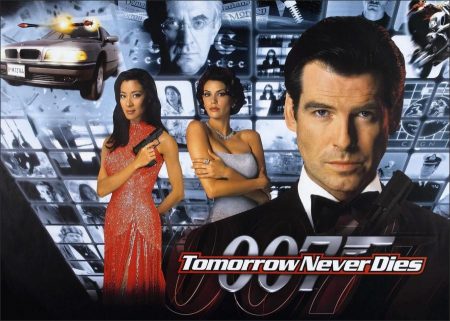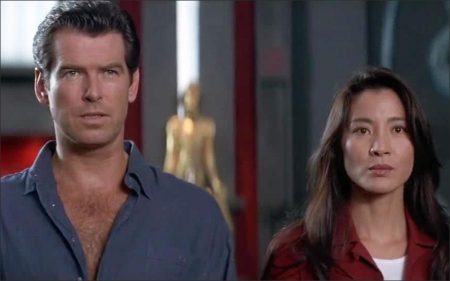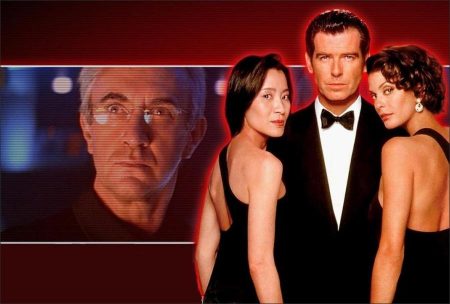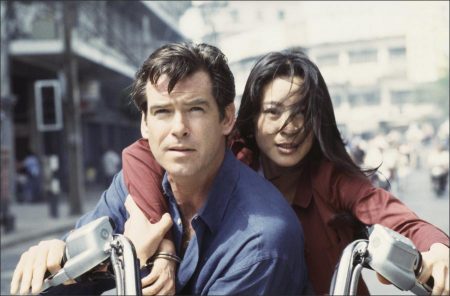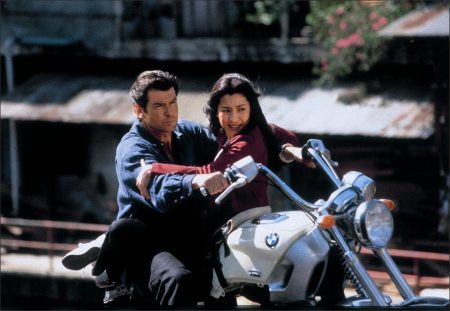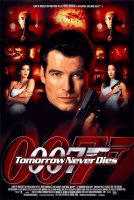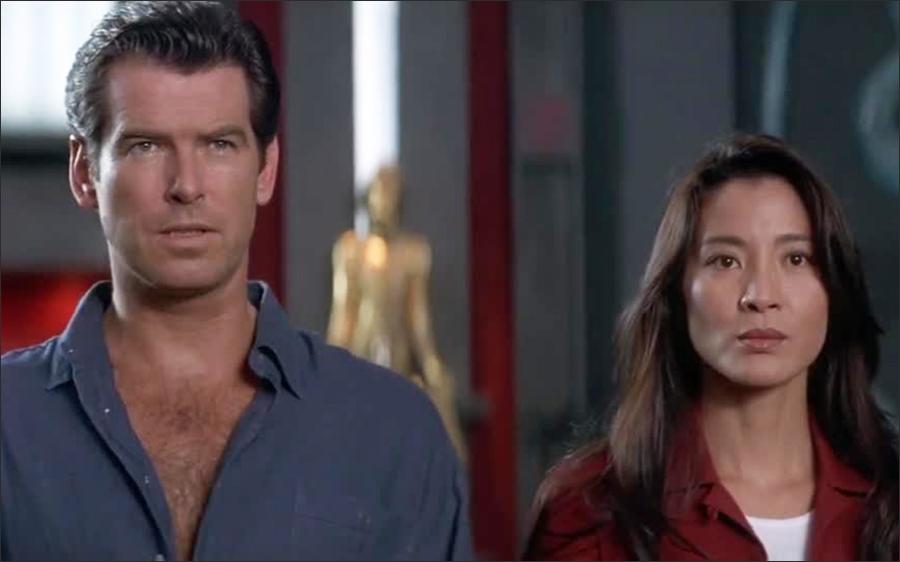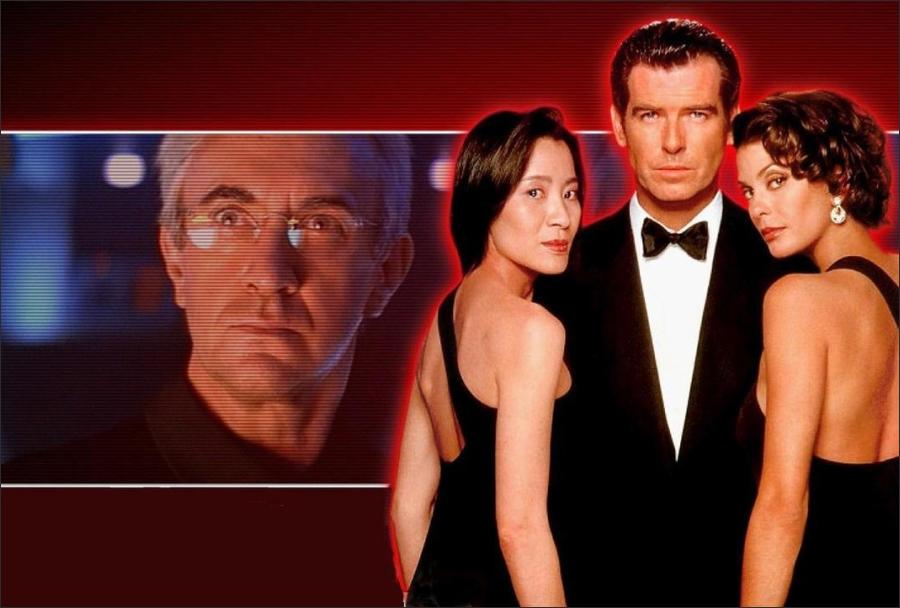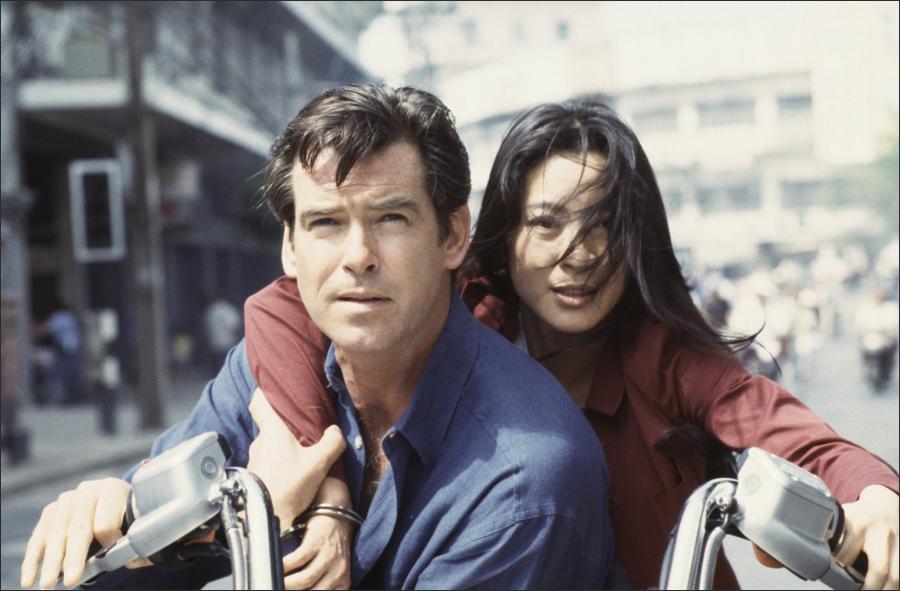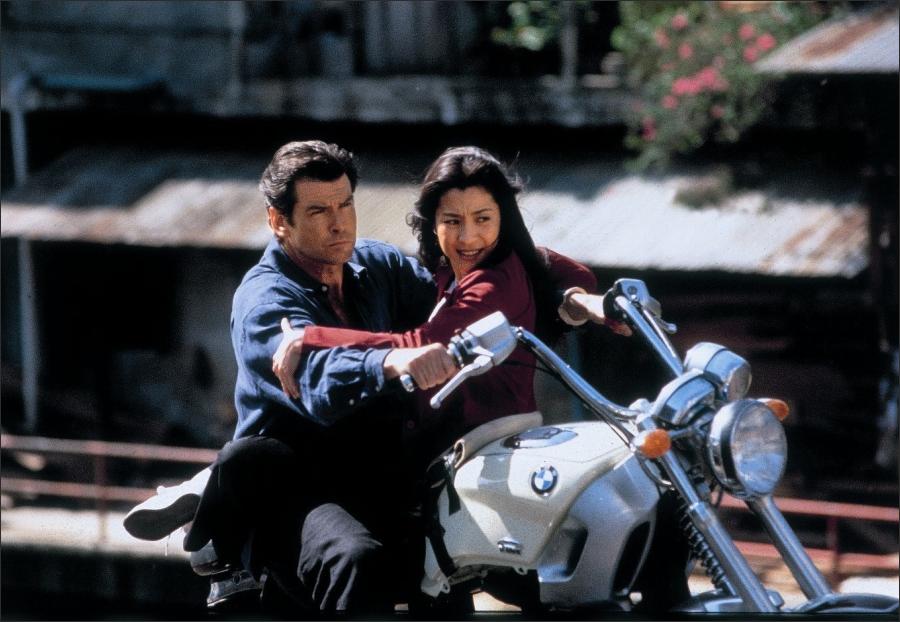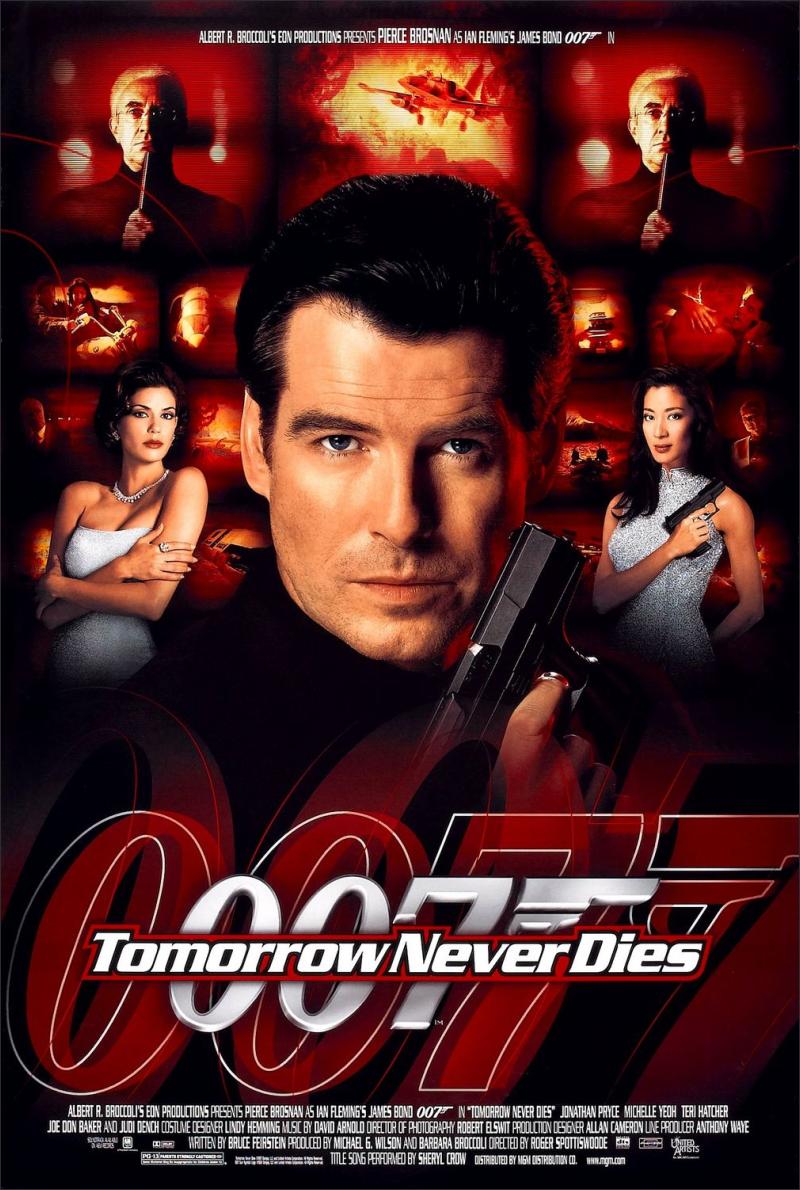Taglines: Tha Man. The Number. The License… are all back.
Tomorrow Never Dies movie storyline. Agent James Bond 007 (Pierce Brosnan), the unstoppable action hero must prevent a tremendous disaster ripped from tomorrow’s headlines. Someone is pitting the world’s superpowers against each other, and only Bond can stop it. When a British warship is mysteriously destroyed in Chinese waters, the world teeters on the brink of World War III until 007 zeros in on the true criminal mastermind.
Bond’s do-or-die mission takes him to Elliot Carver (Jonathan Pryce), a powerful media mogul who manipulates world events as easily as he changes headlines from his global media empire. After soliciting help from Carver’s sexy wife, Paris (Teri Hatcher), Bond joins forces with a stunning yet lethal Chinese Agent, Wai Lin (Michelle Yeoh), in a series of explosive chases, brutal confrontations, and breathtaking escapes as they race to stop the presses on Carver’s next planned news story: global pandemonium.
Tomorrow Never Dies is a 1997 spy film and the eighteenth in the James Bond series to be produced by Eon Productions, and the second to star Pierce Brosnan as the fictional MI6 agent James Bond. Directed by Roger Spottiswoode, with the screenplay written by Bruce Feirstein, the film follows Bond as he attempts to stop Elliot Carver, a power-mad media mogul, from engineering world events to initiate World War III.
The film was produced by Michael G. Wilson and Barbara Broccoli, and was the first James Bond film made after the death of producer Albert R. Broccoli, to whom the film pays tribute in the end credits. Filming locations included France, Thailand, Germany, Mexico and the United Kingdom.
Tomorrow Never Dies performed well at the box office, grossing over $333 million worldwide, becoming the fourth-highest grossing film of 1997 and earned a Golden Globe nomination despite mixed reviews. While its performance at the domestic box office surpassed that of its predecessor, GoldenEye, it was the only one of Pierce Brosnan’s Bond films not to open at number one at the box office, as it opened the same day as Titanic, and finished at number two that week.
About the Production
Following the success of GoldenEye in reviving the Bond series, there was pressure to recreate that success in the film’s follow-up production. This pressure came from MGM which, along with its new owner, billionaire Kirk Kerkorian, wanted the film’s release to coincide with their public stock offering. Co-producer Michael G. Wilson also expressed concern regarding the public’s expectations subsequent to the success of GoldenEye, commenting: “You realize that there’s a huge audience and I guess you don’t want to come out with a film that’s going to somehow disappoint them.”
This was the first Bond film to be made after the death of Albert R. Broccoli, who had been involved with the series’ production since its beginning; the film is dedicated to his memory. The rush to complete the film drove the budget to $110 million. The producers were unable to persuade Martin Campbell, the director of GoldenEye, to return; his agent said that “Martin just didn’t want to do two Bond films in a row.” Instead, Roger Spottiswoode was chosen in September 1996. Spottiswoode said he had previously offered to direct a Bond film while Timothy Dalton was still in the leading role.
Filming Locations
With Vic Armstrong directing the second unit, filming of the $11m 4-minute pre-title sequence began on 18 January 1997 at Peyresourde-Balatestas Airport, Peyragudes in the French Pyrenees. The plane Bond is seen to purloin in the movie was a Czech-built Aero Vodochody L-39ZO Albatros weapons jet trainer, supplied by a British company and flown by stunt pilots Tony “Taff” Smith and Mark (son of Ray) Hanna.
After completing work in France, the second unit moved on to Portsmouth to film the scenes where the Royal Navy prepares to engage the Chinese, with HMS Westminster (F237) standing in for the various fictional Type 23 Frigates in the story. The main unit began filming on 1 April. They were unable to use the Leavesden Film Studios, which they had constructed from an abandoned Rolls-Royce factory for GoldenEye, as George Lucas was using it for Star Wars: Episode I – The Phantom Menace, so instead they constructed sound stages in another derelict industrial site nearby
They also used the 007 Stage at Pinewood Studios. The scene at the “U.S. Air Base in the South China Sea” where Bond hands over the GPS encoder was actually filmed in the area known as Blue Section at RAF Lakenheath. The sea landing used the vast tank built for Titanic in Rosarito, Baja California, Mexico. The MH-53J in the film was from the US Air Force’s 352d Special Operations Group at RAF Mildenhall. Some scenes were planned to be filmed on location in Ho Chi Minh City, Vietnam, and the production had been granted a visa.
This was later rescinded, two months after planning had begun, forcing filming to move to Bangkok, Thailand. Bond spokesman Gordon Arnell claimed the Vietnamese were unhappy with crew and equipment needed for pyrotechnics, with a Vietnamese official saying it was due to “many complicated reasons”. Two locations from previous Bond films were used: Brosnan and Hatcher’s love scene was filmed at Stoke Park, which had been featured in Goldfinger, and the bay where they search for Carver’s stealth boat is Phang Nga Bay, Thailand, previously used for The Man with the Golden Gun.
Spottiswoode tried to innovate in the action scenes. Since the director felt that after the tank chase in GoldenEye he could not use a bigger vehicle, a scene with Bond and Wai Lin on a BMW motorcycle was created. Another innovation was the remote-controlled car, which had no visible driver – an effect achieved by adapting a BMW 750i to put the steering wheel on the back seat.
The car chase sequence with the 750i took three weeks to film, with Brent Cross car park being used to simulate Hamburg – although the final leap was filmed on location. A stunt involving setting fire to three vehicles produced more smoke than anticipated, causing a member of the public to call the fire brigade.[32] The upwards camera angle filming the HALO jump created the illusion of having the stuntman opening its parachute close to the water.[33]
During filming, there were reports of disputes on set. The Daily Mail reported that Spottiswoode and Feirstein were no longer on speaking terms and that crew members had threatened to resign, with one saying “All the happiness and teamwork which is the hallmark of Bond has disappeared completely.”
This was denied by Brosnan who claimed “It was nothing more than good old creative argy-bargy”, with Spottiswoode saying “It has all been made up… Nothing important really went wrong.” Spottiswoode did not return to direct the next film; he said the producers asked him, but he was too tired. Apparently, Brosnan and Hatcher feuded briefly during filming due to her arriving late onto the set one day. The matter was quickly resolved though and Brosnan apologised to Hatcher after realising she was pregnant and was late for that reason.
Tomorrow Never Dies marked the first appearance of the Walther P99 as Bond’s pistol. It replaced the Walther PPK that the character had carried in every Eon Bond film since Dr. No in 1962, with the exception of Moonraker in which Bond was not seen with a pistol. Walther wanted to debut its new firearm in a Bond film, which had been one of its most visible endorsers. Previously the P5 was introduced in Octopussy. Bond would use the P99 until Daniel Craig reverted to the PPK as 007 in Quantum of Solace in 2008.
Tomorrow Never Dies (1997)
Directed by: Roger Spottiswoode
Starring: Pierce Brosnan, Jonathan Pryce, Michelle Yeoh, Teri Hatcher, Joe Don Baker, Judi Dench, Vincent Schiavelli, Samantha Bond, Colin Salmon, Nina Young
Screenplay by: Bruce Feirstein
Production Design by: Allan Cameron
Cinematography by: Robert Elswit
Film Editing by: Michel Arcand, Dominique Fortin
Costume Design by: Lindy Hemming
Set Decoration by: Peter Young
Art Direction by: Ken Court, Jonathan Lee, Giles Masters, Tony Reading, Stephen Scott
Music by: David Arnold
MPAA Rating: PG-13 for intense sequences of action violence, sexuality and innuendo.
Distributed by: Metro Goldwyn Mayer (United States), United International Pictures (International)
Release Date: December 19, 1997
Views: 726
